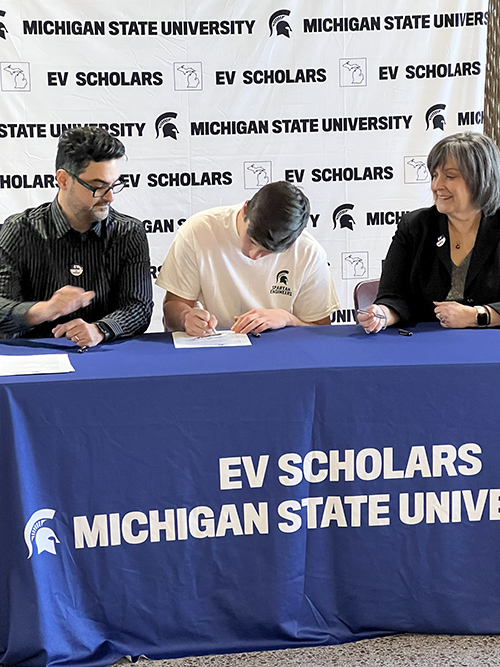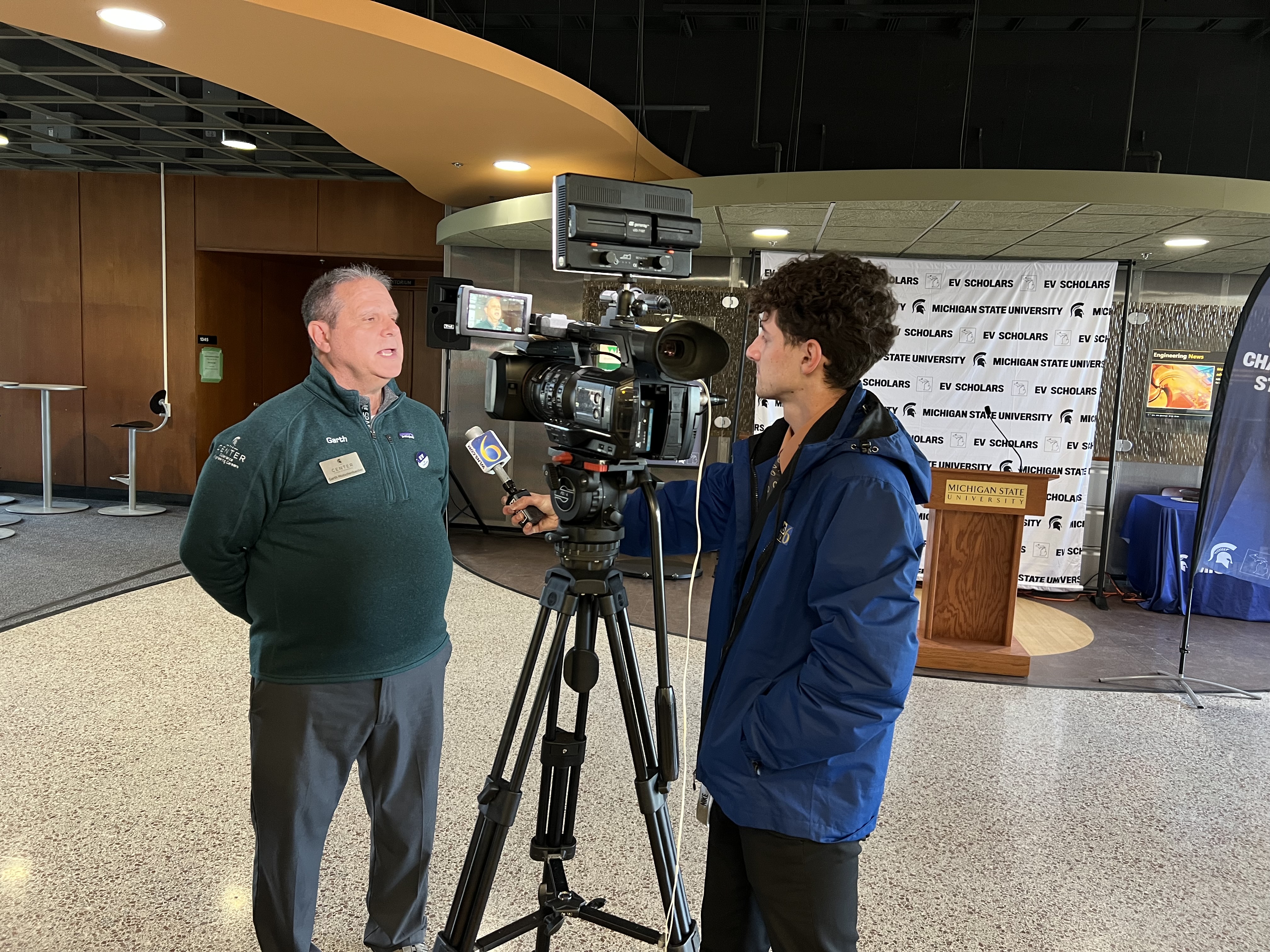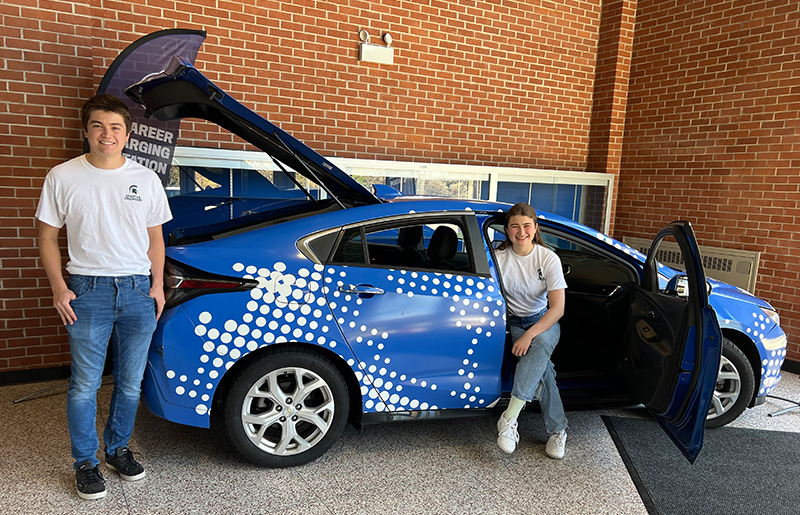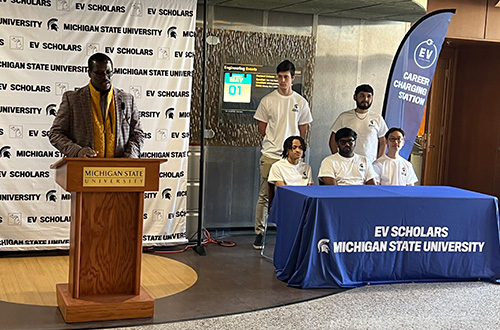The nation’s largest-ever campaign to promote careers and recruit talent to fill jobs in Michigan’s surging electric vehicle and transportation mobility sector will include at least 12 Spartans who are on track for up to $10,000 scholarships while working at EV-related companies in Metro Detroit, Lansing, Jackson, and Saginaw.
Michigan State University and the Michigan Economic Development Corp. put a new spin on “Go Green” by honoring the inaugural class of Michigander EV Scholarship recipients during a “Signing Day” ceremony at MSU’s College of Engineering on April 26.
Students were recognized during a press conference where they signed letters of intent with Michigan corporations for upcoming internship and co-op opportunities with electric vehicles.
“The automotive industry is undergoing a once-in-a-lifetime transformation with the shift to e-mobility, and MSU is thrilled to be a partner with the MEDC to help drive our state forward in this revolutionary industry,” said MSU College of Engineering Employer Engagement Director Garth Motschenbacher.
“This shift has large implications for the state’s future with an opportunity to create up to 300,000 new, good-paying jobs for Michiganders by 2030,” said Motschenbacher, who noted that the average salary for many of these fields is $75,000-plus.
MEDC President and CEO Quentin L. Messer, Jr., said Michiganders embody the kind of grit, determination and work ethic needed to keep the world moving forward.
“As we work to make an electrified future a reality, it’s no surprise that once again Michigan is being recognized as a leader in shepherding this new evolution,” Messer said. “We’re ready to build on our proud legacy and automotive heritage here in Michigan to usher in a greener, more sustainable and electrified future in 2023 and beyond.”
The goal of the signing ceremony was to highlight students in MSU’s Michigander EV Scholars program who have accepted an offer with an EV-related partner company approved by the MEDC’s new Talent Action Team.
“The Michigander EV Scholars initiative that we are celebrating in partnership with Michigan State University, along with our historic talent attraction campaign and strategic investments in higher education partners will help get us there and ensure our state continues to keep our foot on the accelerator driving the future of mobility and electrification,” Messer added.

The MEDC announced March 1 that the Great Lakes State is kicking off the largest-ever campaign in the U.S. to promote careers and recruit talent to fill jobs in Michigan’s surging electric vehicle and transportation mobility sector.
The Michigander EV Scholars program is offering up to $10,000 scholarships to as many as 350 top tech students at participating universities who sign a letter of employment with an approved company and commit to staying for 12 months in Michigan. The MSU EV scholars have accepted internship offers and will receive an initial $5,000 scholarship that qualifies them for the full $10,000 offer upon acceptance of a full-time job in Michigan.
The MEDC Talent Action Team’s public-private partnership is aimed at recruiting EV and mobility talent in 2023 with 15 major Michigan employers, higher education partners including MSU, the University of Michigan, Michigan Technological University, Ferris State University, Macomb Community College and Schoolcraft College, and Michigan Works! agencies across the state.
The top positions EV-related core employers in the automotive sector need support with recruiting include software developers, electrical engineers, production workers and front-line supervisors. While Michigan has had success in increasing the number of graduates in these fields, the state’s goal is to rapidly accelerate skilling in computer science, engineering, and manufacturing to meet growing industry demand.
Students participating in the event, their anticipated graduation and respective employers are:
- Eduardo Ferdinandi of Birmingham – Computer Science / Spring 26 | General Motors (Warren)
- Kurk Edwards of Oak Park – Electrical Engineering / Spring 24 | Commonwealth Association (Jackson)
- Pranav Rakkappan of Northville – Applied Engineering-Computer / Spring 24 | Toyota (Ann Arbor)
- Dauan Hendley of Detroit – Electrical Engineering / Spring 2024 | Nissan (Farmington Hills)
- Brian Garcia Ibarra of Pontiac – Electrical Engineering / Fall 2023 | Ford Motor (Dearborn)
- Shane Pat of Thailand – Computer Science / Spring 2024 | Ford Motor (Allen Park)
- Noah Sanders of Benton Harbor – Computer Engineering / Fall 2024 | Nexteer (Saginaw)
- Nyah Williams of Detroit – Electrical Engineering / Sprint 2025 | Lansing Board of Water & Light
- Manov Singh of Lansing – Computer Science / Spring 2024 | Lansing Board of Water & Light
- Morghane McAnelly of Rochester Hills – Computer Science / Fall 2024 | Ford Motor (Allen Park)
- Chris Martin of Northville – Electrical Engineering / Spring 2024 | American Axle (Detroit)
- Logan Lara of Grand Rapids – Computer Engineering / Spring 2025 | Lear Corporation (Troy)
Michigan is already leading the charge to position the U.S. as a global EV/mobility competitor through increased manufacturing capacity, research and development, and the state’s ranking as first in the nation for mobility-related patents.

Last year, the state attracted over $14 billion in electric vehicle and battery investments while developing programs to train and employ the next generation of talent in the EV/mobility sector. At the same time, Michigan has more than 3,000 jobs available this year in the EV and mobility sector for emerging and skilled workers that employers say are critical to fill now for current and future success.
The EV and mobility campaign is one phase of an overall $34 million talent attraction and retention strategy the MEDC is introducing in 2023 to help in-state businesses struggling to fill key in-demand and high-growth jobs with the goal of growing the workforce population long term.
The campaign will start with a heavy focus on in-state retention and recruitment. It also will target some key out-of-state markets before transitioning to a national campaign. The $34 million comes from $115.6 million that was allocated to the MEDC in a bipartisan vote last year by the Michigan Legislature for business attraction, community revitalization and entrepreneurship programs.
The 15 Michigan employers engaging with the state, Michigan Works! and partner universities include some of the world’s most successful and innovative companies that are shaping the future of America’s roadways — one electric vehicle at a time: BorgWarner, Bosch, Dana Inc., Denso, Ford, Gentex Corp., General Motors, LG Energy Solution, Magna, Mahle, Nexteer, Our Next Energy, Shape Corp., Toyota, and ZF.
This story originally appeared on the College of Engineering website.
Read more about Mobility at Michigan State University.

